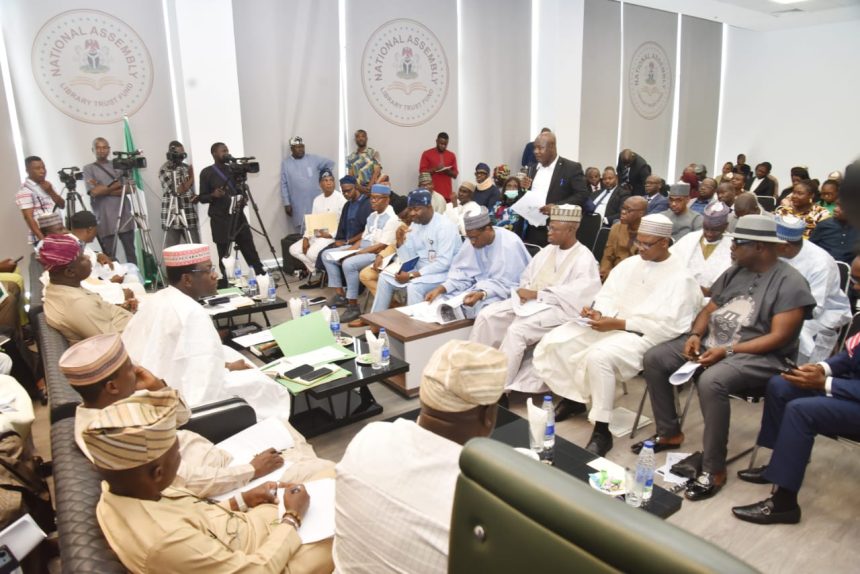The House of Representatives Committee on Housing and Habitat recently convened a crucial meeting with stakeholders in the housing sector to discuss the Ministry of Finance Incorporated’s (MOFI) newly approved Real Estate Investment Fund.
The engagement aimed to explore the fund’s potential to address Nigeria’s growing housing deficit and promote collaboration across key players in the industry.
The meeting was attended by prominent figures, including the Minister of Housing and Urban Development, Arc. Ahmed Musa Dangiwa; the Managing Director/CEO of the Federal Mortgage Bank of Nigeria (FMBN), Usman Shehu Osidi; representatives from the Federal Housing Authority (FHA); Real Estate Developers Association of Nigeria (REDAN); Housing Development Advocacy Network (HDAN), Mortgage Banking Association of Nigeria (MBAN) and Family Homes Funds Limited (FHFL).
In his address, Arc. Ahmed Musa Dangiwa lauded the federal government for prioritizing the housing sector under the Renewed Hope Agenda. “This initiative demonstrates a renewed awakening in housing and urban development. Traditional funding methods are insufficient, so innovative financing mechanisms like the MOFI Real Estate Investment Fund are crucial,” Dangiwa remarked.
He cited lessons from Algeria, which successfully built one million homes in a year by integrating affordability measures, including cross-subsidization. “We need a framework where 20-30% of funding is allocated to affordable housing. This ensures inclusivity while maintaining the same external quality for all buildings,” he emphasized.

The MD/CEO of the Ministry of Finance Incorporated (MOFI), Dr. Armstrong Takang, highlighted President Bola Ahmed Tinubu’s directive to prioritize liquidity in the housing sector and stressed the need for accessible and affordable mortgages with longer repayment terms to address affordability challenges and reduce the prevalence of abandoned houses.
Usman Shehu Osidi, MD/CEO of FMBN, highlighted the need to empower the bank through recapitalization to deliver more affordable mortgages. “The FMBN should focus on creating mortgages, while FHA and private developers handle housing construction. We also need to address the single obligor limit to ensure seamless mortgage disbursements,” he said.
Osidi called on the committee to facilitate collaboration with the Central Bank of Nigeria (CBN) to remove barriers, noting that such efforts would enable FMBN to significantly expand its reach.
Festus Adebayo, Executive Director of HDAN, expressed total optimism about the initiative but called for clear frameworks and collaboration. “MOFI’s plan to finance both demand and supply sides is commendable, but issues like land titles and outdated laws must be addressed. We also urge MOFI to work closely with FMBN and FHFL as its commence operation,” Adebayo noted.
He further advocated for amendments to the Land Use Act and other housing-related legislation, pledging HDAN’s support in lobbying for the necessary reforms.
President of MBAN, Ebliate MAC-Yoroki and other representatives from the CBN expressed support for the establishment of the investment fund, emphasizing the importance of a well-structured and approved framework.
Executive Director ( Finance)of the Federal Housing Authority stressed their mandate to provide affordable housing. “We need access to dormant funds lying in various accounts to construct homes priced between ₦3 million and ₦5 million. This will address Nigeria’s housing needs effectively,” the representative stated, urging the committee to advocate for better utilization of available funds.
Mr Emmanuel oyelowo representative of REDAN emphasized the importance of enabling laws to drive affordability. “The lack of a foreclosure law hampers our ability to recover investments when buyers default. Mortgage reforms are essential to sustain housing initiatives,” a REDAN representative argued.
In his response, the Chairman of the House Committee on Housing and Habitat, Hon. Abdulmumin Jibrin, delivered a candid critique of stakeholders’ readiness for legislative amendments. “You are not fully prepared to push for these changes. The regulatory framework remains a critical gap that must be addressed. Regulation will transform the sector and attract significant investments,” Jibrin stated.
He assured stakeholders of the committee’s commitment to supporting initiatives that align with the federal government’s housing agenda, emphasizing the need for immediate action to unlock the sector’s potential.
The meeting focused on a collective agreement stressing the importance of collaboration. Stakeholders expressed their commitment to ensuring the MOFI Real Estate Investment Fund achieves its goal of delivering affordable housing while revitalizing the housing sector.



